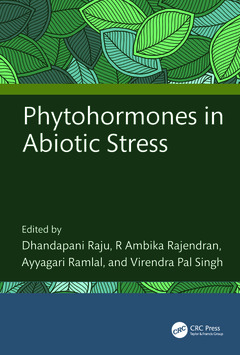Phytohormones in Abiotic Stress
Coordonnateurs : Raju Dhandapani, Rajendran R Ambika, Ramlal Ayyagari, Singh Virendra Pal

Plants are continuously exposed to different environmental stresses that negatively impact their physiology and morphology, resulting in production reduction. As a result of constant pressure, plants evolve different mechanisms for sustenance and survival. Hormones play a major role in defences against the stresses and stimulate regulatory mechanisms. One of the ways through which they mitigate stress is via the production of hormones like auxins, ethylene, jasmonic acid, etc. The phytohormones help in signaling and enhance the chances of their survival. Plant hormones play many vital roles from integrating developmental events, physiological and biochemical processes to mediating both abiotic and biotic stresses. This book aims to highlight these issues and provide scope for the development of tolerance in crops against abiotic stresses to maximize yield for the growing population. There is an urgent need for the development of strategies, methods and tools for the broad-spectrum tolerance in plants supporting sustainable crop production under hostile environmental conditions.
The salient features are as follows:
? It includes both traditional and non-traditional phytohormones and focuses on the latest progress emphasizing the roles of different hormones under abiotic stresses.
? It provides a scope of the best plausible and suitable options for overcoming these stresses and puts forward the methods for crop improvement.
? It is an amalgamation of the biosynthesis of phytohormones and also provides molecular intricacies and signalling mechanisms in different abiotic stresses.
? This book serves as a reference book for scientific investigators from recent graduates, academicians and researchers working on phytohormones and abiotic stresses.
Unit I: Introduction
Chapter 1: Hormones: biosynthesis to roles in plants
Chapter 2: Plant hormones mediated alleviation of abiotic stress
Chapter 3: Recent discoveries and prospects of phytohormones
Unit II: Phytohormones in abiotic stresses
Section I: Traditional phytohormones
Chapter 4: Role of abscisic acid in abiotic stresses
Chapter 5: Auxins in abiotic stresses
Chapter 6: Regulatory role of cytokinin in abiotic stress tolerance of plants
Chapter 7: Ethylene in abiotic stresses
Chapter 8: Roles of gibberellic acid in abiotic stresses
Section II: Non-traditional phytohormones
Chapter 9: Role of brassinosteroids in abiotic stresses
Chapter 10: Indoleamines in abiotic stresses
Chapter 11: Jasmonic acid: A critical player in abiotic stress
Chapter 12: Roles of karrikins in abiotic stresses
Chapter 13: Nitric oxide and its roles in dealing with abiotic stress
Chapter 14: Responses of oxylipins to abiotic stresses
Chapter 15: Role of polyamines in abiotic stresses
Chapter 16: Peptide hormones with emphasis on abiotic stress tolerance in plants
Chapter 17: Role of salicylic acid in abiotic stresses
Chapter 18: Strigolactones: Mediator in abiotic stress responses
Unit III: Molecular interactions and future prospects
Chapter 19: Signalling transduction, molecular interactions and crosstalk of hormones during abiotic stress
Chapter 20: Engineering phytohormones for development of tolerant varieties
Chapter 21: Phytohormones: Past, Present and Future
Dr Dhandapani Raju is a Senior Scientist of Plant Physiology in the Division of Physiology, Indian Agricultural Research Institute (ICAR-IARI), Delhi, India. He completed his under graduation in Agriculture from Tamil Nadu Agricultural University (TNAU), Tamil Nadu, India. He pursued his post-graduation in agriculture with a specialization in plant physiology from C. S. Azad University of Agriculture and Technology, Uttar Pradesh, India. He completed his doctoral degree in plant physiology from the Indian Agricultural Research Institute. He has been awarded “young scientist” by the Indian Society of Plant Physiology, New Delhi, India for his outstanding work on phenotyping banana fruits and identifying vitamin A enrichment gene (phytoene synthase gene) first time in bananas. His academic achievements are evident from possessing various awards, scholarships and merit medals (book prizes, ICAR-JRF, IARI-SRF & ICAR-ARS) at the national level during post-graduation education. He is the recipient of several best poster and oral presentation awards at the national level. Through agricultural research and development, he has invented five technologies, registered three international patents and published more than 15 peer-reviewed articles in both international and national journals of repute. He has currently working on high throughput phenotyping of rice plants for drought tolerance for the last four years. He has hands-on experience in the phenotyping of whole-plant transpiration and developed the software for automatic and near real-time estimation of WUE in rice. He has hands-on experience in both structural and functional genomics techniques for nucleic acid isolation, quality testing and gene expression analysis. He is also involved in teaching and guiding students at the post-graduation level. He has guided 09 MSc students to date. He has conducted three national-level trainings for professionals at state and central levels. Currently, he is working
Date de parution : 06-2024
17.8x25.4 cm
Thèmes de Phytohormones in Abiotic Stress :
Mots-clés :
Hormones, Phytohormones, Abscisic acid, Brassinosteroids, Oxylipins, Signalling transduction



